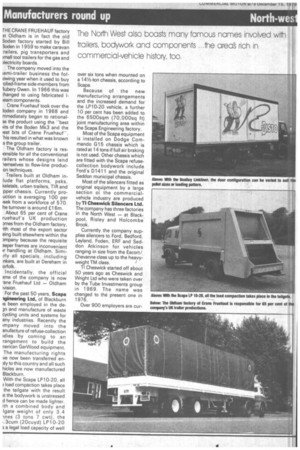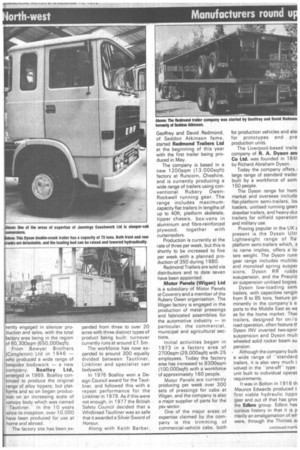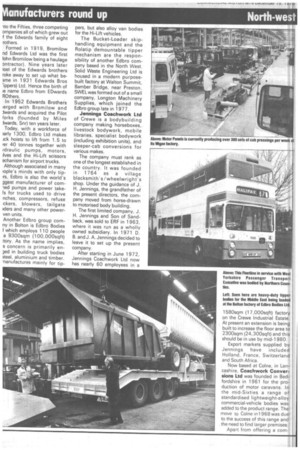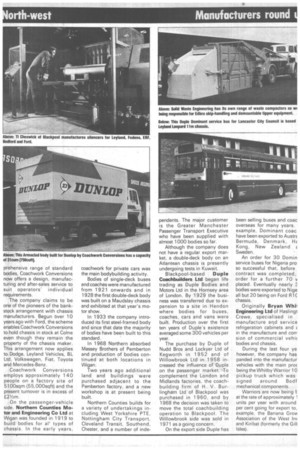Manufacturers round up
Page 46

Page 47

Page 48

Page 49

If you've noticed an error in this article please click here to report it so we can fix it.
The Non West also boasts many famous names involved wi trailers, bodywork and components ...the area rich in commercial-vehicle history, too.
THE CRANE FRUEHAUF factory 3t Oldham is in fact the old 3oden factory started by Bill 3oden in 1959 to make caravan :railers, pig transporters and ;mall tool trailers for the gas and .lectricity boards.
The company moved into the ierni-trailer business the folowing year when it used to buy .oiled-frame side-members from lubery Owen. In 1966 this was :hanged to using fabricated }earn components.
Crane Fruehauf took over the loden company in 1968 and mmediately began to rational3e the product using the -best 'its of the Boden Mk3 and the )est bits of Crane Fruehauf
his resulted in what was known s the group trailer.
The Oldham factory is resionsible for all the conventional railers whose designs lend lemselves to flow-line producon techniques.
Trailers built at Oldham inlude flat platforms, psks, keletals, urban trailers, TIR and pper chassis. Currently prouction is averaging 100 per reek from a workforce of 570. he turnover is around £16m. About 65 per cent of Crane ruehauf's UK production Dmesfrom the Oldham factory, ith most of the export sector aing built elsewhere within the )mparty because the requisite aeper frames are inconvenient )1handling at Oldham. Simiirly all specials, including nkers, are built at Dereham in orfolk.
Incidentally, the official 3me of the company is now ane Fruehauf Ltd — Oldham For the past 50 years, Scapa vineering Ltd, of Blackburn is been employed in the dejn and manufacture of waste cycling units and systems for any industries. Recently the impany moved into the anufacture of refuse-collection )dies by coming to an rangement to build the nerican GarWood equipment. The manufacturing rights ye now been transferred enaly to this country and all such hides are now manufactured Blackburn.
With the Scapa LP10-20, all load compaction takes place the tailgate with the result it the bodywork is unstressed d hence can be made lighter. Ith a combined body and lgate weight of only 3.4 Ines (3 tons 7 cwt), the ,.3cum (20cuyd) LP10-20 3a legal load capacity of well over six tons when mounted on a 141/2-ton chassis, according to Scapa.
Because of the new manufacturing arrangements and the increased demand for the LP10-20 vehicle, a further 10 per cent has been added to the 6500sqm (70,000sq ft) joint manufacturing area within the Scapa Engineering factory, Most of the Scapa equipment is installed on Dodge Commando G15 chassis which is rated at 14 tons if full air braking is not used. Other chassis which are fitted with the Scapa refusecollection bodywork include Ford's D1411 and the original Seddon municipal chassis.
Most of the silencers fitted as original equipment by a large section oi the commercialvehicle industry are produced by TI Cheswick Silencers Ltd. The company has three factories in the North West — at Blackpool, Risley and Holcombe Brook.
Currently the company supplies silencers to Ford, Bedford, Leyland, Foden, ERF and Seddon Atkinson for vehicles ranging in size from the Escort/ Chevanne class up to the heavyweight TM class.
TI Cheswick started off about 50 years ago as Cheswick and Wright Ltd who were taken over by the Tube Investments group in 1969. The name was changed to the present one in 1976.
Over 900 employers are cur ently engaged in silencer prouction and sales, with the total actory area being in the region f 60,300sqm (650,000sqft).
From Bowyer Brothers Congleton) Ltd in 1946 —
ho produced a wide range of bespoke bodywork — a new ompany, Boalloy Ltd, emerged in 1969. Boalloy coninued to produce the original range of alloy tippers; but platorms and so on began production on an increasing scale of canopy body which was named "Tautliner."' In the 10 years since its inception, over 10:000 have been produced for use at home and abroad.
The factory site has been ex
panded from three to over 20 acres with three distinct types of product being built: turnover currently runs at around £7.5m.
The workforce has now expanded to around 300 equally divided between Tautliner, Linkliner and specialist van bodywork.
In 1 976 Boalloy won a Design Council award for the Tautliner, and followed this with a repeat performance for the Linkliner in 1979. As if this were not enough, in 1977 the British Safety Council decided that a Whitbread Tautliner was so safe that it awarded a Silver Sword of Honour.
Along with Keith Barber, Geoffrey and David Redmond, of Seddon Atkinson fame, started Redmond Trailers Ltd at the beginning of this year with the first trailer being produced in May.
The company is based in a new 1200sqm (13,000sqft) factory at Runcorn, Cheshire, and is currently producing a wide range of trailers using conventional Rubery OwenRockwell running gear. The range includes maximumcapacity flat trailers in lengths of up to 4011, platform skeletals, tipper chassis, box-vans in aluminium and fibre-reinforced plywood, together with curtainsiders.
Production is currently at the • rate of three per week, but this is shortly to be increased to five per week with a planned production of 350 during 1980.
Redmond Trailers are sold via distributors and to date seven have been appointed.
.Motor Panels (Wigan) Ltd is a subsidiary of Motor Panels at Coventry and a member of the Rubery Owen organisation. The Wigan factory is engaged in the production of metal pressings and fabricated assemblies for the automotive industry — in particular, the commercial, municipal and agricultural sections.
Initial activities began in 1973 in a factory area of 2700sqm (29,000sqft) with 25 employees. Today the factory area has increased to 9300sqm (100,000sqft) with a workforce of approximately 160 people.
Motor Panels are currently preducing per week over 300 sets of pressings for cabs at Wigan, and the company is also a major supplier of parts for the psv sector.
One of the major areas of expertise claimed by the company is the trimming of commercial-vehicle cabs, both for production vehicles and alsi for prototypes and pre production units.
The Liverpool-based traile company of R. A. Dyson am Co Ltd. was founded in 184( by Richard Abraham Dyson.
Today the company offers ; large range of standard trailer built by a workforce of som, 150 people.
The Dyson range for horn market and overseas include flat-platform semi-trailers, lo), loaders, unitised running gears drawbar trailers, and heavy-dut trailers. for oilfield operation and military use.
Proving popular in the UK E present is the Dyson Ultr Lightweight range of fla: platform semi-trailers which, a its name implies, offers a Io tare weight. The Dyson runn gear range includes multile and monoleaf spring susper sions, Dyson RR rubb€ susupension, and the Pneuric air suspension unitised bogies.
Dyson low-loading seM trailers, with capacities rangin from 8 to 85 tons, feature pri minently in the company's e. ports to the Middle East as wE as for the home market. Thes trailers, designed for on / o road operation, often feature th Dyson INV inverted two-sprir suspension and Dyson mull wheeled solid rocker beam su pension.
, Although the company buil( a wide range of "'standard trailers, it is also very much i volved in the "one-offtype unit built to individual operat requirements.
It was in Bolton in 1916th Maurice Edwards produced t first viable hydraulic tippir gear and out of that has grov the Edbro group. Edbro has curious history in that it is p manly an amalgamation of wh were, through the Thirties al to the Fifties, three competing Dmpanies all of which grew out f the Edwards family of eight rothers.
Formed in 1919, Bromilow nd Edwards Ltd was the first lohn Bromilow being a haulage Dntractor). Nine years later lost of the Edwards brothers roke away to set up what beme in 1 931 Edwards Bros 'ippers) Ltd. Hence the birth of e name Edbro from EDwards ROthers.
In 1952 Edwards Brothers ■ erged with Bromilow and iwards and acquired the Pilot forks (founded by Miles iwards, Snr) ten years later. Today, with a workforce of :arly 1300, Edbro Ltd makes Ack hoists to lift from 1.5 to fer 40 tonnes together with rdraulic pumps, motors, Ives and the Hi-Lift scissors echanism for airport trucks. Although associated in many iople's minds with only tip!rs, Edbro is also the world's ggest manufacturer of cornled pumps and power takeIs for trucks used to drive nches, compressors, refuse ckers, blowers, tailgate iders and many other poweryen units.
Another Edbro group cornfly in Bolton is Edbro Bodies I which employs 110 people a 9300sqm (100,000sqft) :tory. As the name implies, S concern is primarily enged in building truck bodies steel, aluminium and timber. -nanufactures mainly for tip
pers, but also alloy van bodies for the Hi-Lift vehicles.
The Bucket-Loader skiphandling equipment and the Rolatip demountable tipper mechanism are the responsibility of another Edbro company based in the North West. Solid Waste Engineering Ltd is housed in a modern purposebuilt factory at Walton Summit, Bamber Bridge, near Preston. SWEL was formed out of a small company, Longton Machinery Supplies, which joined the Edbro group late in 1977.
Jennings Coachwork Ltd of Crewe is a bodybuilding company making horseboxes, livestock bodywork, mobile libraries, specialist bodywork (including exhibition units), and sleeper-cab conversions for various makes.
The company must rank as one of the longest established in the country. It was founded in 1764 as a village blacksmith's / wheelwright's shop. Under the guidance of J. H. Jennings, the grandfather of the present directors, the company moved from horse-drawn to motorised body building.
The first limited company, J. H. Jennings and Son of Sandback, was sold to ERF in 1963, where it was run as a wholly owned subsidiary. In 1971 D. B. and J. A. Jennings decided to leave it to set up the present company.
After starting in June 1972, Jennings Coachwork Ltd now has nearly 60 employees in a 1580sqm (17,000sqft) factory on the Crewe Industrial Estate. At present an extension is being built to increase the floor area to 2300sqm (24,300sqft) and this should be in use by mid-1980.
Export markets supplied by Jennings have included Holland, France, Switzerland and South Africa.
Now based at Colne, in Lancashire, Coachwork Conversions Ltd was founded in Bedfordshire in 1961 for the production of motor caravans. In the mid-Sixties a range of standardised lightweight-alloy commercial-vehicle bodies was added to the product range. The move to Colne in1968 was due to the success of this range and the need to find larger premises.
Apart from offering a corn prehensive range of standard bodies, Coachwork Conversions now offers a design, manufacturing and after-sales service to suit operators individual requirements.
The company claims to be one of the pioneers of the bankstock arrangement with chassis manufacturers. Begun Over 10 years ago with Ford, the scheme enables Coachwork Conversions to hold chassis in stock at Colne even though they remain the property of the chassis maker. This arrangement now applies to Dodge, Leyland Vehicles, BL Ltd, Volkswagen, Fiat, Toyota and Mercedes-Benz.
Coachwork Conversions employs approximately 140 people on a factory site of 5100sqm (55,000sqft) and the present turnover is in excess of E21/2m.
On the passenger-vehicle side, Northern Counties Motor and Engineering Co Ltd at Wigan was founded in 1 91 9 to build bodies for al' types of chassis. In the early years, coachwork for private cars was the main bodybuilding activity.
Bodies of single-deck buses and coaches were manufactured from 1921 onwards and in 1928 the first double-deck body was built on a Maudslay chassis and exhibited at that year's motor show, ln 1933 the company introduced its first steel-framed body and since that date the majority of bodies have been built to this standard.
In 1968 Northern absorbed Massey Brothers of Pemberton and production of bodies continued at both locations in Wigan.
Two years ago additional land and buildings were purchased adjacent to the Pemberton factory, and a new workshop is at present being
Northern Counties builds for a variety of undertakings including West Yorkshire PTE, Nottingham City Transport, Cleveland Transit, Southend, Chester, and a number of inde
pendents. The major customer is the Greater Manchester Passenger Transport Executive who have been supplied with almost 1000 bodies so far.
Although the company does not have a regular.export market, a double-deck body on an Atlantean chassis is presently undergoing tests in Kuwait.
Blackpool-based Duple Coachbuilders Ltd began life trading as Duple Bodies and Motors Ltd in the Hornsey area of London. By 1929 the business was transferred due to expansion to a site in Hendon where bodies for buses, coaches, cars and vans were built. Production over the first ten years of Duple's existence averaged some 300 vehicles per year.
The purchase by Duple of Nudd Bros and Lockyer Ltd of Kegworth in 1952 and of Willowbrook Ltd in 1958 increased the influence of Duple on the passenger market. To complement the London and Midlands factories, the coachbuilding firm of H. V. Burlingham Ltd of Blackpool was purchased in 1960, and by 1 968 the decision was taken to move the total coachbuilding operation to Blackpool. The Willowbrook side was sold in 1 971 as a going concern.
On the export side Duple has been selling buses and coac overseas for many years, example, Dominant coac have been exported to AustrE Bermuda, Denmark, Fit Kong, New Zealand Sweden.
An order for 30 Domin service buses for Nigeria pro so successful that, before contract was completed, order for a further 70 v placed. Eventually nearly bodies were exported to Nige all but 20 being on Ford R1C chassis.
Originally Bryan Whii Engineering Ltd of Haslingt Crewe, specialised in manufacture arid service refrigeration cabinets and in the manufacture and con. sion of commercial vehit bodies and chassis.
During the last four ye however, the company has panded into the manufactur vehicles with the main pro( being the Whitby Warrior 10 pickup truck which was signed around Bedf mechanical components.
Warriors are now being t: at the rate of approximately 1 units per year with around per cent going for export to, example, the Banana Grovi Association of the West In( and Kiribat (formerly the. Gilt Isles).




















































































































